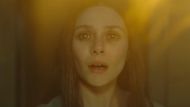WandaVision redefined how the superhero genre in its entirety is something that’s not just confined to the four walls surrounding Marvel but something could exist so naturally on television.
Far from a simple regular Marvel spin-off, the series immersed fans in a shifting televised reality crafted by Wanda herself.
This wasn’t just a story about love or loss – it was about television also. A meditation on important aspects like grief, control, and illusion, WandaVision used the medium’s own language to look at how identity can fracture under the heavy weight of sorrow, grief and memory.
Television as trauma language in WandaVision
WandaVision doesn’t merely reference old-timey TV sitcoms; it speaks their language fluently. The show’s retro sitcom homages – from The Dick Van Dyke Show all the way to Modern Family – aren’t just decorative pieces.
They’re Wanda’s language. A language she learnt during her childhood. A language she clung to just mere moments before Sokovia being blasted off.

Her constructed town – Westview becomes a living rerun, a looped safe space where trauma is denied through a specific format. But while these aesthetics seem delightful, the structure that comes forward eventually is scrutinized.
The artificial and false cheer and laughter within a false world, mask a spiralling grief that resists containment.
This is where WandaVision shifts from nostalgia to meta-narrative. The audience – within and outside the show – become part of the show. Wanda doesn’t fully account for being watched, yet the surveillance by S.W.O.R.D, Monica, Jimmy, Darcy, Agatha Harkness (‘Agnes’), and Vision himself becomes intrusive for Wanda.
The boundary between viewer and the subject eventually dissolves. As each episode peels down the many layers of the show, the classic structure collapses.
Wanda attempts to control her world through narrative, through television, especially the kind that mimics reality, the type that has never allowed for autonomy for the others on her ‘show’.
WandaVision weaponizes the genre against its creator, forcing Wanda to confront the dissonance between performance and actual and real pain. She may stage and control the show but cannot control the consequences that stem from this control of hers.
The illusion of control and the unraveling self
Grief is most central to WandaVision, but another aspect to look out for is control. Wanda’s sitcom world offers perfect illusions – love, safety, happiness, motherhood, - but it’s tightly at all times regulated by her.
Every small crack in the narrative – like the beekeeper, rolling the credits while having an argument with Vision, or turning a S.W.O.R.D drone into a helicopter – all threaten collapse. With each and every intrusion, Wanda rewrites the plot and the story.

Yet, this constant back and forth with editing parts from her show, reveals instability in her own self rather than power.
Her grip loosens as Vision starts to question his own reality because he 'cannot remember who is he is', with the neighbours’ breaking characters and malfunctioning, and outsiders like S.W.O.R.D and Agatha intrude in her small happy made-up world.
This carefully styled genre homages – each decade a different set of assumptions – can’t sustain a truth, something that Wanda won’t accept.
What’s revolutionary and unreal about this MCU Disney+ project is that it turns the protagonist into an unreliable narrator and showrunner too. She isn’t merely grieving; she’s actively authoring a lie to eventually delay the inevitable. But the lie has weight and consequences too, doesn’t it?
The citizens of Westview suffer immensely under her control, embodying the cost of her refusing to accept her closure and truth. Even Agnes’ manipulations serve to reflect Wanda back to herself.
And when the show moves towards its fourth-wall breakings, it doesn’t simply do so for cinematic effects – it reveals the collapse of Wanda’s curated self.
The world she built to avoid pain, Westview, ultimately demands that she finally feels it herself. And only in giving up control can she finally begin to heal.
WandaVision transforms the superhero narrative into a self-examining, reflective study of grief, and media. By weaponizing televisional tropes, it critiques how we use stories to cope – and at the same time, avoid.
Wanda’s attempt to direct her own rerun fails, but in this unravelling, the show offers the deepest of truths to the fans: no fantasy, no matter how expertly curated, can hold reality on the sidelines forever.
Stay tuned to Soap Central for more news, updates about TV Shows, Films, Daily Soaps, pop culture & more.
